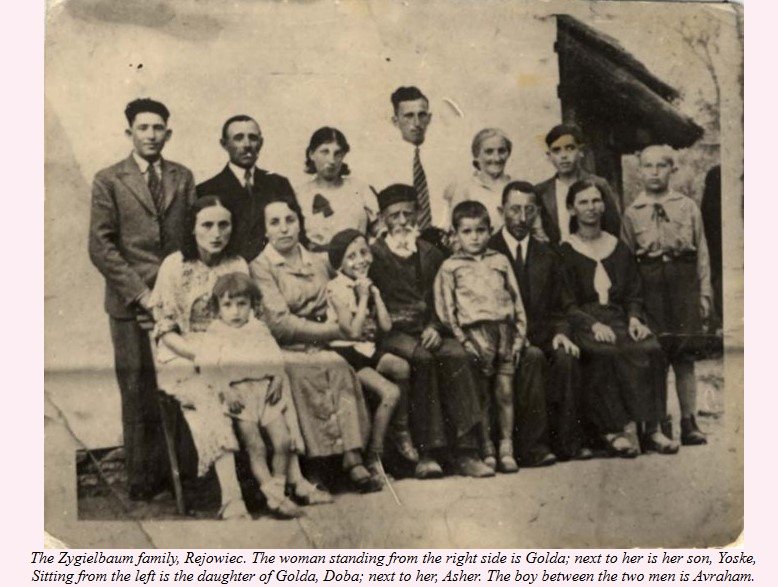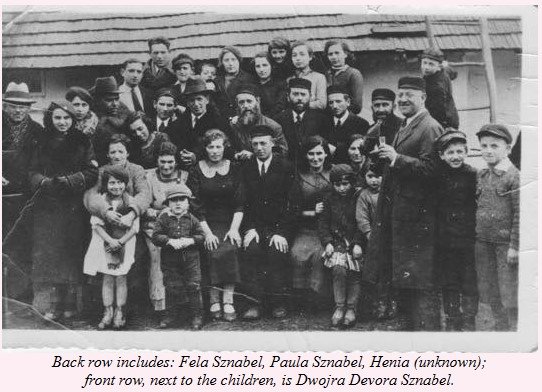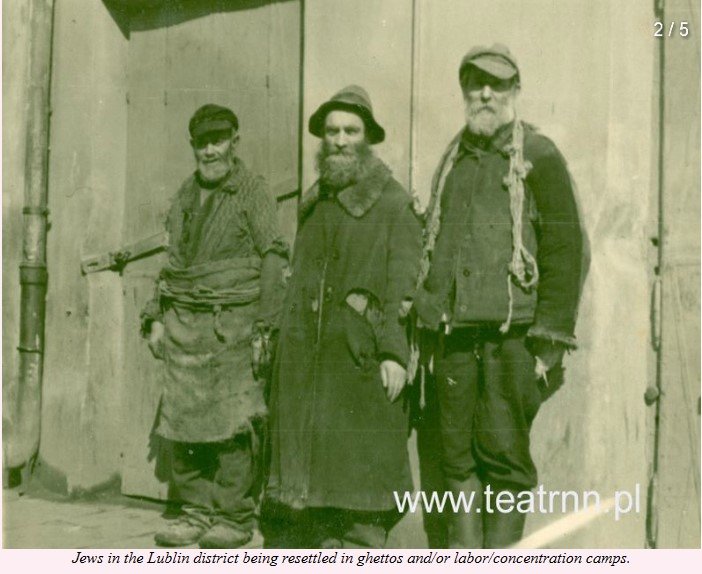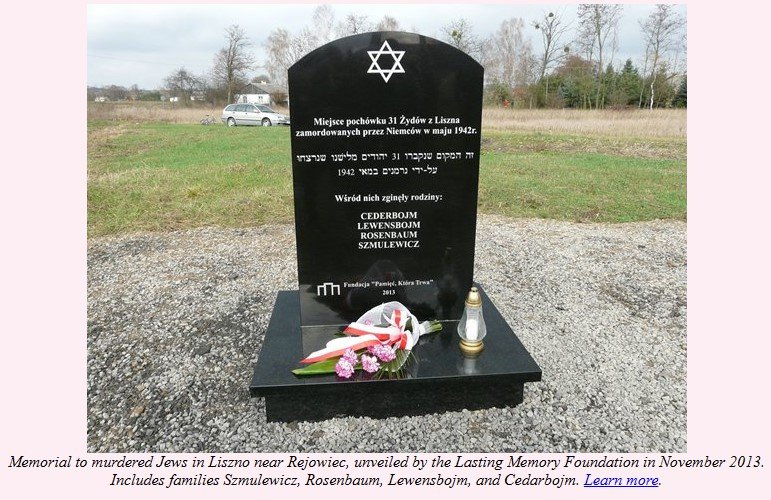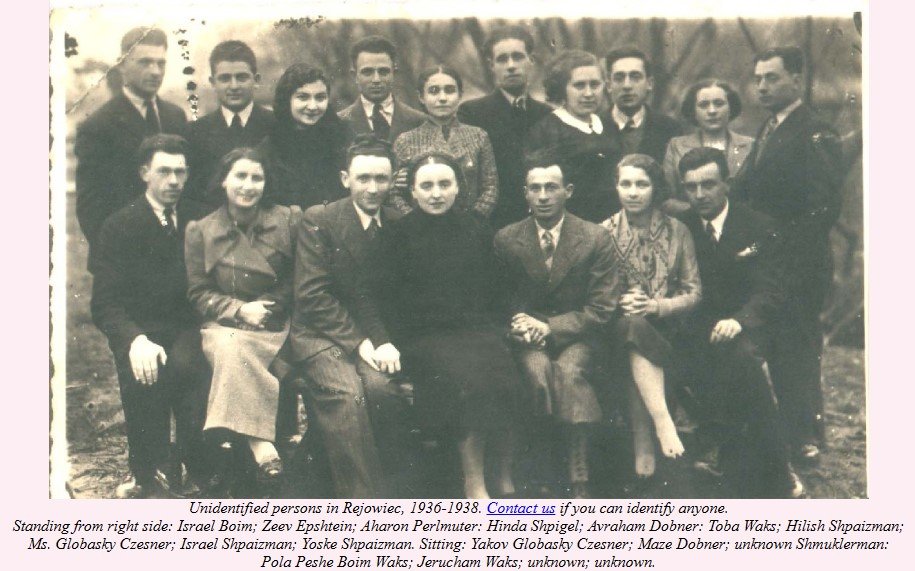Remember Jewish Rejowiec
Pronunciation: Ray-yove-yitz
HISTORY OF JEWISH REJOWIEC
Rejowiec is a village in Chelm County, Lublin Voivodeship, in eastern Poland. Its current population is 2,114 and it is 11 miles SW of Chelm and 32 miles east of the regional capital of Lublin.
The Jewish community is recorded back to 1547. In 1701 it had 122 Jewish inhabitants. In 1712 an independent Jewish community was formed (breaking away from Chelm). The residents were involved in trade. Oil mills, tanneries, and saw mills were developed. Jews lived in the central district. 1827 data shows that the town had 509 inhabitants, 275 of whom were Jewish. In 1857 there were 824 Jews out of around 1,135 residents. According to the 1920 data, there were 3,226 people in town, including 2,506 Jews -- who constituted about 77% of the total population of the town. In 1914, the community board had 22 Poles, two Orthodox church members and one Jew. Siedliszcze joined the Jewish community in Rejowiec in 1915. From 1910 to 1918, S. Borensztejn was the town rabbi.
A synagogue, a house of prayer, a mikveh and a religious school operated in all Rejowiec in the interwar period. Both the Bund and Zionist groups began to gain strength in interwar years. In the 1930s Pinkwas Gotlib was president of the Rejowiec Jewish community and other board members were: Zyl Biderman, Matys Pike, Chaim Wurman, and Nachman Goldstein. The rabbi was Hersh Jahr. Anti-Semitism was an issue for Rejowiec in the 1930s. Anti-Jewish riots took place in 1937.
Rejowiec had around 3,500 Jews in 1939. Nearby villages also had Jewish populations, including: Kanie (20 Jews) and Liszno (45 Jews).
REJOWIEC DURING THE HOLOCAUST
The Nazis invaded Rejowiec in September of 1939. There were small scale murderers and actions. In February 1941, at the market place, the Germans burned down the Torah and other books from the house of prayer. Soon thereafter the synagogue was also destroyed. The Judenrat was formed in early 1940 and it included Wolf Blatt, Chairman, and unknown Holcblatt. By April of 1940, Germans established a ghetto where they gathered about 3,000 Jews. The ghetto borders were Niecala and Zacisze streets. as well as the area of the western part of the marketplace between Reja and Zwierzynski streets.
Rejowiec became a transit ghetto where Jews from Europe were sent. Some of the deportations included:
-- unknown number of Jews from Krakow, Lodz, Pomerania, and Dortmund in 1940;
-- 1,300 Jews from Lublin and Krakow in 1941;
-- 1,040 Jews from Slovakia on April 16, 1942;
-- unknown number of Jews from Theresienstadt Ghetto, Czechoslovakia on April 18, 1942;
-- 1,030 Jews from Slovakia on April 20, 1942;
-- 1,630 Jews from Slovakia on May 23, 1942;
-- 1,022 Jews from Slovakia on May 24, 1942;
-- 1,000 Jews from Slovakia on May 25, 1942
A listing of the refugees who lived in Rejowiec in December, 1940 is available here.
By late 1941 the ghetto had 2,380 Jews. In total, more than 6,000 Jews from Czechoslovakia, Slovakia, Hungary, and Germany were sent to the Rejowiec transit ghetto in April and May of 1942 alone.
Jewish slave laborers took part in forced labor on a farm as well as at the lumber mills in Zawadowka and in Chelm. Around 500 men were forced to drain swamps in the area. According to one witness, Jews in the ghetto received 250 grams of bread daily, a thin barley-groats soup for lunch, and a black 'coffee' for dinner. Another 600 Jews were selected by the Jewish Ghetto Police (Ordnungsdienst) to be relocated to nearby labor camps such as Sawin, Sajczyce, or Chelm. Due to insufficient food and horrible sanitary conditions, many cases of typhus and dysentery existed.
On April 7, 1942, 2,000 Jews were gathered in the Rejowiec marketplace. Elderly Jews were shot dead on the spot while others -- around 2,400 total -- were sent to the Sobibor Death Camp. On May 2, there was a transport of 2,400 Jews to the Belzec Death Camp. After these deportations, around 500 Jews remained in the ghetto. The ghetto was cleared when ~300 Jews were then imprisoned in Krychow Labor Camp.
Additional Jews from Slovakia were transported (see above transports), and in October of 1942, around 2,400 Jews were forced to walk to the Rejowiec train station, where they were held up in cattle cars and shipped to the nearby Sobibor Death Camp. Known Rejowiec victims are listed here.
Judenrat members among the non-Polish Jews included: Mr. Kessler, Mrs. Forbeth, Mrs. Femes (Slovakia) Mrs. Kaufmann, and Mrs. Singer. The Jews remaining in Chelm set up a communal kitchen under Frankel. The names of some of the victims of the Rejowiec Transit Ghetto (who were not from Poland) are known:
- Mr. Appel
- Mr. Berliner from Humenne
- Engineer Berstein
- Dr. Abraham Birkenfeld from Sabinov
- Dr. Josef Deutsch
- Dr. and Mrs. Grossman from Sabinov
- Miss Holander
- Mr. and Mrs. Horovitz
- Jewish council member Kessler
- Mr. Klein and his son
- Mr. Moskovits from Humenne
- Mrs. Nagel
- Mr. and Mrs. Perlstein from Sabinov
- Jewish council member Reiss
- Mr. Rosin from Humenne
- Dr. Sebok from Sabinov
Around 300 Jews remained in the Rejowiec ghetto after the above aktions. A number of Jews from the Rejowiec Ghetto worked daily at the Budny estate (also referred to as Ossolinski Palace), 1/2 a mile outside of the city. The Waffen S.S. ran the estate and included over 50 men led by S.S. man Herbert Schoenfelt. Jews were collected every day from the ghetto and escorted to the Budny estate for
slave labor. Additionally, Jews in Rejowiec worked in forced labor at the distillery, on road construction, or to dismantle the synagogue.
In November, 1942, 290 Jews in Rejowiec were recorded by the Germans as working at various labor sites, while another 385 were recorded at other forced labor camps in the Rejowiec vicinity. In the spring of 1943, most of the remaining Jews were working at the Budny estate. On April 7 and July 2, most of the Jews who remained imprisoned in the ghetto Rejowiec were taken to Majdanek Concentration Camp, where they were murdered. After this, 16 Jews remained in Rejowiec. They were murdered in July 1944 when alliedforces were closing in on the Germans. After the war, the Nazi S.S. officer who executed the last 16 Jews was tried in Chelm.
The Nazis in charge of the operations at the Rejowiec Transit Ghetto were: Raschendorf at Chelm, Johann Loeffler at Krychow (originated in Chemnitz district), Hilvert at Osowa, Bayko (28 years old) at Osowa, Ondyk (formerly a butcher) at Sawin, and Engineer Holzheimer, Chelm Chief of Water Supply. Other S.S. men in Rejowiec included: unknown Astar, Gustav Jeski, Ostar Peter (or surname Ostarpeter), unknown Layis, Herbert Schonfeldt, and others who have been judged.
Please donate to the Jewish Records Index - Poland translation of Rejowiec records. Without your support, we can't appropriately memorialize our families.
Please review the site content below. Zachor - We Remember.
-----------------------------------------------------------------------------------------
[Surnames] [History] [Wikipedia - Rejowiec]
[Cemetery] [Synagogue] [Geni.com: Jewish Families from Rejowiec]
[Yizkor Book Translation to English] [Family Research in Southeast Poland]
------------------------------------------------------------------------------------------
Return to Lublin IndexLINKS
Join the Rejowiec group on Facebook!
Town of Rejowiec:
- Interview with Simcha Dobner, Rejowiec Survivor
- Rejowiec Congregation in Israel
- Rejowiec: Then and Now
- Rejowiec Transit Ghetto
Families of Rejowiec:
- Czesner family
- Karpenkopf family
- Krojtman family
- Szpajzman family
- Other families
Majdan Tatarski Ghetto Victims (Lublin) from Rejowiec:
- Jakob Ajzenstajn
- Laja Gryzolet
- Sura Gryzolet
- Laja Szulman
- Sura Turkieltaub
(source: Brama Grodzka - Teatr NN)
Survivors of Rejowiec:
- Feyge Bornstein
- Wolf Bornstein (Borenstein)
- Zalman Bornstein
- Frida Boym (Bojm)
- Sara Boym (Bojm)
- Szmuel Belik
- Meyer Bergman
- Dobah Bukhshtayn
- Simcha "Simon" Dobner
- Feyge Eisenberg
- Isadore Eisenberg
- Yoel Eisenberg
- Natan Eisenstein
- Pearl Eisenstein
- Chaim Yoel Feldman
- Ester Fishman
- Leybl Fishman
- Simcha Fishman
- Yite Flechman
- Gutshe Flechtman
- Helen Frenkel
- Chana Gancarsky
- Hene Goldfarb
- Sally Goldwasser
- Ishayahu Gruber (Groober)
- Sol Gruber
- Pesia Hirsz
- Nina Litwak
- Yankel Mitsfliker
- Yakov Mitsfliker
- Moshe Reuven Mitsfliker
- Shimshon Mitsfliker
- Chaim Pechter
- Ester Pechter
- Fiszel Pechter
- Hana Peltsman
- Tziporah Libhaber Pestes
- Yosef Paypermacher
- Sara Rab
- Lea Rochberg
- Pola Rotker
- Leon Rosenfeld
- Anna Schlossberg
- Sara Schwarzberg
- Itshe Shafran
- Moshe Shafran
- Pinhas Shefer
- Feyge Shnabel
- Leybl Shnabel
- Pola Shnabel
- Yehiel "Chil" Shnabel
- Reyzl Shpigel
- Sara Shpigel
- Samuel Singer
- Hilish Shpeyzman
- Itshcak Shpeyzman
- Isroelke Shpeyzman
- Yehuda Staynberg
- Zehava Pechter Szwergold
- Getsl Tzwern
- Efraim Waks
- Feyge Waks
- Malka Waks
- Meyer Waks
- Moritz Waks
- Nachum Waks
- George Waldman
- Israel Warman
- Gabriella Guta Libhaber Wisenblit
- Pearl Zamshein
- Harry Zamstein
- David Zonshein
- Chaja Zonshein
- Ester Zilberman
- Sima Zilberman
- Efraim Zinger
- Sara Zinger
Rabbis of Rejowiec:
- Israel HaLevi Bornsztajn
- Hersz Jahr
- Abraham Alter Suchachewski
Genealogy:
Jewish Records Indexing Poland - Rejowiec
Jewish Vital Records in the Polish State Archives
Remember Your Family:
Central Judaica Database - Museum of History of Polish Jews
Grandchildren of Holocaust Survivors on Facebook
Guide to the YIVO Archives
Holocaust News/Events from Generations of the Shoah Int'l
Holocaust Survivors and Victims Database
JewishGen Family Finder
JewishGen Holocaust Database
JRI-Poland: Search for Your Family
Museum of History of Polish Jews Introduction
Yad Vashem: Search for Your Family
Yad Vashem: Submit Names of Your Family Members
Yad Vashem Requests Photos of Shoah Survivors and Families
CONTACTS
ISRAEL: Tova Waks
Israeli Organization of Rejowiec Descendants
E-mail: tova.waks@weizmann.ac.il
U.S.: LublinJewish@gmail.com
Rejowiec town map (Hebrew).
Siedliszcze near Rejowiec - List of Recipients of Foodstuffs and Clothes from Americans, 1940
1. Chana Bron
2. Necha Gera
3. Szyja Gajer
4. Hena Gajer
5. Szajndla Gelb
6. Fratel Grynszpan
7. Bajla Nechama Grynszpan
8. Moszek Shyja Horn
9. Laja Wojsztat (sp?)
10. L? Tou
11. Josek Szpor
12. Pesach Zylberman
13. Tojyve Lederman
14. Rywka Motyka
15. Moszko Krydman?
16. Chaim Festberg
17. Boruch Kos
18. Froim Kejzman
19. Bencjan Kac
20. Fajga Dina Kos(?)
21. Mendel Rozencwajg
22. Szaja Szryft
23. Chaim Szpajsman
24. Pejsach Teper
25. David Szafran
26. Srul Szmulewicz
27. David Sznajderman
28. Srul Terner
source: JDC Archives
Return to Lublin Index

